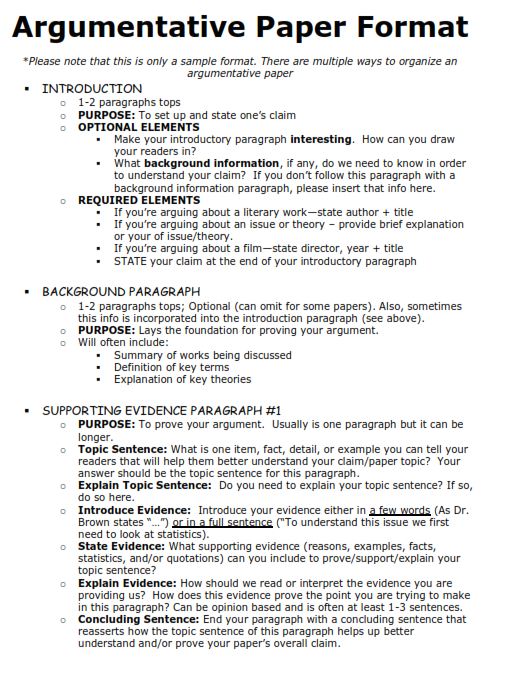
Just like any other academic writing, you need a foundation to build your essay on. An introduction is the foundation of your essay. A proper and perfect intro will make your paper flawless and vice-versa.
An argumentative essay outline is a plan through which the writer works and organizes the raw data. An outline provides you a track to follow for your papers and essays.
Outlining might scare you and confuse you if you have never developed one before, but once you know how to create one, it will be a lot easier to draft a perfect argumentative essay.
The last part of the writing process of the outline is a conclusion. Now that you have adequately structured the introduction and the body paragraphs, its time to conclude your essay.
Background Information

Make sure that the length of the conclusion is the same as the introduction. Short and precise conclusions are effective. In conclusion, a writer should never introduce new ideas and extra information.
- Restating your thesis statement.
- Summarizing basic argument.
- Recommending a course of action to the readers.
After providing evidence for your claim, identify and include opposing views and counter-arguments and debunk it. There is always another side to the argument. Use evidence to disprove these opposing side and arguments.

In other words, the thesis must be something that different people could reasonably have different opinions on. If the thesis of your research paper is something that people generally agree upon or accept as fact, you have no reason to persuade anyone.
Revisit your thesis statement to add some controversy and counterarguments to it and improve its logic.
Want some final advice on how to write a thesis statement for a research paper? Use this simple formula for writing your thesis:
- “Communication with peers helps adolescents achieve a sense of belonging.”
- “Social interaction improves adolescents’ self-esteem and communication skills.”
📝 Steps in developing your thesis statement

- The thesis is too factual. A strong thesis statement should not just repeat the facts. Instead, it should represent your argument or position on the topic. Ask yourself what it is that you will be trying to prove in your paper and revise your thesis statement so that it answers this question clearly.
- The thesis is too vague. You should avoid merely announcing your research paper topic. Make your original and specific take on the subject clear to the reader.
- The thesis is too subjective. Your thesis statement and entire research paper need to be based on thorough research, in-depth analysis, and critical assessment. Don’t be guided by your personal taste or opinions. When you make a judgment, always explain your reasoning.
- The thesis cannot be proven. This one is simple: If your thesis statement cannot be proven, you shouldn’t try to prove it. Avoid making universal, black-and-white judgments that oversimplify complex problems. One clear sign of this problem is using “always “or “never” in your thesis statement.
Still feeling confused? Think of it this way: Your thesis statement is the king, and every element in your research paper structure serves the king.
To make your thesis statement more effective, avoid these all-too-common mistakes:
A thesis statement is the central element of any academic paper. It summarizes the main ideas of the paper, gives a roadmap for the project, and prepares readers for what will follow.

We suggest choosing only reliable and accurate sources. You may use both old sources which may give the more clear understanding of the basis, and new sources that include most relevant data.
You have to keep in mind your audience, because audience determines the preferred arguments. There is a big difference between talking to classmates or a professor. Estimate the background of your audience, to make sure that you provide them with all necessary facts so they could understand all specific features of the subject. Another important moment is that you may use different language when talking toan audience of different kinds.
If you use citations, make sure that you write them according to a proper format. All quotes must be written in quotation marks, because otherwise, it will be considered plagiarism. Your quotes and list of used sources (Works Cited or Bibliography) must be written according to one of the academic citation standards (MLA, Chicago, or APA). If you don’t know which citation format to use, ask your teacher or professor.
Your topic must fit the format of the paper. Given that argumentative essay implies arguing in support of a certain view, your topic must be arguable. You shouldn’t choose some issues that have obvious solutions or don’t imply alternative views. For example, if you’re writing about vitamins and their impact on health, you unlikely will find arguments against vitamins.
Structuring of Argument
The first thing that requires your creativity skills is the title. Make your title catchy and interesting
Once you’ve written the introduction, plan the body part of your essay. You have to make sure that you consider all the important aspects of the issue. You cannot mention certain points too briefly just because they are opposite to your thesis. Consider counterarguments in detail and explain why these points are wrong. Maybe an opposite side relies on outdated information, or its logic is inaccurate – you can use it to prove why your point is the only right one.
Consider the rhetorical situation of your essay. In other words, keep in mind the purpose of the essay, the audience, and the setting. Don’t forget that not only you have to provide readers with enough information, but also to persuade them towards your point.
First of all, you have to familiarize yourself with the format of an argumentative essay and its purpose. Essays of this type are aimed to investigate a certain topic or issue. You have to conduct a research and gather as many data as possible, to make sure that you consider all crucial details and provide your readers with various points of view on this subject. At the same time, you have to convince readers to accept your point.

We suggest choosing only reliable and accurate sources. You may use both old sources which may give the more clear understanding of the basis, and new sources that include most relevant data.
You have to keep in mind your audience, because audience determines the preferred arguments. There is a big difference between talking to classmates or a professor. Estimate the background of your audience, to make sure that you provide them with all necessary facts so they could understand all specific features of the subject. Another important moment is that you may use different language when talking toan audience of different kinds.
If you use citations, make sure that you write them according to a proper format. All quotes must be written in quotation marks, because otherwise, it will be considered plagiarism. Your quotes and list of used sources (Works Cited or Bibliography) must be written according to one of the academic citation standards (MLA, Chicago, or APA). If you don’t know which citation format to use, ask your teacher or professor.
Your topic must fit the format of the paper. Given that argumentative essay implies arguing in support of a certain view, your topic must be arguable. You shouldn’t choose some issues that have obvious solutions or don’t imply alternative views. For example, if you’re writing about vitamins and their impact on health, you unlikely will find arguments against vitamins.
Structuring of Argument
The first thing that requires your creativity skills is the title. Make your title catchy and interesting
Once you’ve written the introduction, plan the body part of your essay. You have to make sure that you consider all the important aspects of the issue. You cannot mention certain points too briefly just because they are opposite to your thesis. Consider counterarguments in detail and explain why these points are wrong. Maybe an opposite side relies on outdated information, or its logic is inaccurate – you can use it to prove why your point is the only right one.
Consider the rhetorical situation of your essay. In other words, keep in mind the purpose of the essay, the audience, and the setting. Don’t forget that not only you have to provide readers with enough information, but also to persuade them towards your point.
First of all, you have to familiarize yourself with the format of an argumentative essay and its purpose. Essays of this type are aimed to investigate a certain topic or issue. You have to conduct a research and gather as many data as possible, to make sure that you consider all crucial details and provide your readers with various points of view on this subject. At the same time, you have to convince readers to accept your point.

It can also be effective to read the opposition through the lens of your own argument and the evidence you’ve used to support it. If the evidence you’ve already included supports your argument, it probably doesn’t support the opposing viewpoint. Without being too obvious, it might be worth pointing this out when you address the opposition.
Why does an argumentative essay need a thesis, though? Well, the thesis statement—the sentence with your main claim—is actually the entire point of an argumentative essay. If you don’t clearly state an arguable claim at the beginning of your paper, then it’s not an argumentative essay. No thesis statement = no argumentative essay. Got it?
You’ve chosen a topic or, more likely, read the exam question telling you to defend, challenge, or qualify a claim on an assigned topic. What do you do now?
Understanding how to incorporate evidence and explanations to your advantage is really important. Here’s why: when you’re writing an argumentative essay, particularly on standardized tests or the AP exam, the exam scorers can’t penalize you for the position you take. Instead, their evaluation is going to focus on the way you incorporated evidence and explained it in your essay.
A Better Argument

Of course you’ve done your research like we talked about. Supporting your claim in your thesis statement is where that research comes in handy.
Oftentimes, teachers will ask you to “address the opposition” in your argumentative essay. What does that mean, though, to “address the opposition?”
That’s where explanations—or analysis, or interpretations—come in. You never want to just stick some quotes from an article into your paragraph and call it a day. You do want to interpret the evidence you’ve included to show your reader how that evidence supports your claim.
So you’ve chosen your topic, decided what your position will be, and written a thesis statement. But like we see in comment threads across the Internet, if you make a claim and don’t back it up with evidence, what do people say? “Where’s your proof?” “Show me the facts!” “Do you have any evidence to support that claim?”
